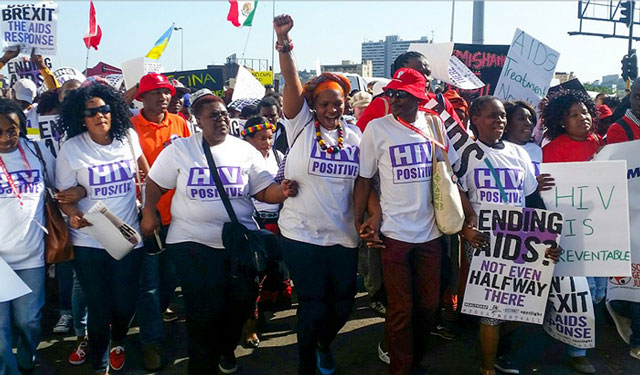
Paris, France | AFP | To young African migrant women seeking help at a centre outside Paris, AIDS is much more than a disease. It is social death.
The women, some of whom were infected after being raped on the perilous journey across land and sea to Europe, complain of the triple burden of disease, stigma and economic insecurity.
“When they told me I had AIDS, I wanted to jump out of a window,” said Catherine (not her real name). “The social workers held me back.”
Catherine learned her status shortly after her arrival in France in 2013 when she went to a hospital with lesions on her face.
“When you have this disease, everyone rejects you, even your children,” said the 43-year-old who fled conflict in the west African country of Mali, where HIV is still shrouded in silence and stigma.
“You scare people. For us, AIDS means prostitution,” she said, explaining that Malians immediately suspect infected women of being promiscuous — even if the men who infected them are known to have multiple sexual partners.
– Finding ‘hope’ –
Catherine, who brought her two children with her to France, says she has found “hope” at the centre run by the association Sol en Si (short for Solidarite-Enfants-Sida — Solidarity-Children-AIDS) in the high-rise suburb of Bobigny.
For the past 20 years the centre has been helping HIV-positive migrants, many of them raising children in state-run emergency housing, to feed and clothe their babies, learn French and prepare their residency applications.
In a sign of the taboo nature of HIV and AIDS among many immigrant African communities there are no posters or brochures about prevention, testing or treatment at the centre.
“The secrecy is crucial. We have women who have cut themselves off entirely from their community and others who are hiding their status from their partner and children,” psychologist Florence Buttin said.
Ella, a 34-year-old wearing bright red lipstick and a wax print head wrap, was among those who decided against telling her family she is HIV-positive.
Admitting to hiding the kitchen knife after preparing food in case she cut herself — HIV is transmitted through body fluids, such as blood, semen and breast milk — she said Sol en Si had helped her “share the burden”.
– Torture, rape, slavery –
A group of confident, well-dressed “old-timers” who have been in France for a few years take the new arrivals under their wing.
“It helps the newcomers to see the old-timers radiant, healthy and employed,” said Edith Dimfa, a social worker.
Fatou, a 36-year-old migrant from Ivory Coast, sits in silence with her infant twins, her face expressionless.
Her journey to Europe, HIV-positive and pregnant, took her through Libya, where migrants face detention, torture, rape and even being sold into slavery.
It was “very hard”, is all she can bring herself to say.
Taibou, a Guinean refugee, also has her head bowed.
“At first, I couldn’t admit it (to being HIV-positive). I came just for nappies and milk,” said Taibou, who believes she contracted the virus after sexual relations with a man who promised her a visa.
“Recently we’ve begun seeing women who have…. crossed entire countries on their own, were raped on the boats, locked up. Others were ‘helped’ by men to get papers. They are broken,” Buttin said.
After four years of treatment and counselling, Catherine, who has found work as a cleaner, is passionate about spreading a more positive message about living with HIV.
She dreams of returning to Mali one day to set up an information centre for women “to show that you can have children, that it’s not hopeless if you have HIV.”
Then, she says, she will be able to tell her family. “By talking, you can change things.”
 The Independent Uganda: You get the Truth we Pay the Price
The Independent Uganda: You get the Truth we Pay the Price



